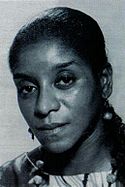Sylvia del Villard facts for kids
Quick facts for kids
Sylvia del Villard
|
|
|---|---|

Actress, dancer, choreographer and Afro-Puerto Rican activist
|
|
| Born | February 28, 1928 |
| Died | February 28, 1990 (aged 62) |
| Nationality | Puerto Rican |
| Notes | |
|
del Villard was the first and only director of the office of the Afro-Puerto Rican affairs of the Puerto Rican Institute of Culture.
|
|
Sylvia del Villard (February 28, 1928 – February 28, 1990) was a talented actress, dancer, and choreographer. She was also an important Afro-Puerto Rican activist. She worked hard to celebrate and protect the culture of Black Puerto Ricans.
Contents
Early Life and Education
Sylvia del Villard was born in Santurce, a part of San Juan, Puerto Rico. As a child, she loved to dance and entertain her parents, Agustin and Marcoline Del Villard. Her family saw how talented she was. She was also a very good student in school.
After finishing high school in Santurce, she received a scholarship from the government of Puerto Rico. This scholarship allowed her to go to college. She studied Sociology and Anthropology at Fisk University in Tennessee, USA. However, she faced unfair treatment there because of her race.
Because of these challenges, she returned to Puerto Rico. She then studied at the University of Puerto Rico and earned her degree.
After graduating, Del Villard moved to New York City. There, she attended the City College of New York. During this time, she developed a deep love for African culture. She joined a song and ballet group called "Africa House." She even traced her family roots back to the Yoruba people of Nigeria. Sylvia also took dance and voice lessons at the Metropolitan Opera.
Acting and Dance Career
Sylvia del Villard performed in many plays and dance shows. Some of her theater roles in Puerto Rico and other countries included La Muerte (Death), La Tempestad (The Storm), and Let My People Go.
As a ballerina, she danced in American productions like Valley Without Echo and Witches of Salem. In Puerto Rico, she joined the Afro-Boricua Ballet. With this group, she performed in Afro-Puerto Rican shows such as Palesiana y Aquelarre.
In 1968, she started her own group called the Afro-Boricua El Coqui Theater. This group became very important for Black Puerto Rican culture. They even got a contract to perform in other countries and at universities in the United States.
Del Villard admired the poet Luis Palés Matos. In 1970, she opened a theater and school in San Juan named after him. However, she soon closed it due to complaints from neighbors. Many, including Sylvia, felt these complaints were unfair. This led her to move to Hollywood, California, for a while.
Fighting for Afro-Puerto Rican Culture
Later, Sylvia moved back to New York. There, she started a new theater group called Sininke. They performed often at the American Museum of Natural History.
In 1981, she made history. She became the first and only director of the office for Afro-Puerto Rican affairs. This office was part of the Puerto Rican Institute of Culture. Sylvia del Villard was known for speaking out. She strongly fought for equal rights for Black Puerto Rican artists.
Later Years and Legacy
In 1989, while in California, Sylvia del Villard was diagnosed with lung cancer. She returned to Puerto Rico for treatment. Sylvia del Villard passed away on February 28, 1990, in San Juan, Puerto Rico.
Her legacy lives on. In 1993, Banco Popular de Puerto Rico created a musical tribute called Ocho Puertas: Un Especial para la historia (Eight Doors: A Historical Special). This show honored Sylvia del Villard and other artists.
Today, there are places named after her. In the East Village of New York City, there is the Sylvia Del Villard Program at the Roberto Clemente Center. In Chicago, the Segundo Ruiz Belvis Cultural Center has a Sylvia Del Villard Hall. These places help keep her memory and her important work alive.
See also
 In Spanish: Sylvia del Villard para niños
In Spanish: Sylvia del Villard para niños
- List of Puerto Ricans
- List of Puerto Ricans of African descent
- French immigration to Puerto Rico
- History of women in Puerto Rico

